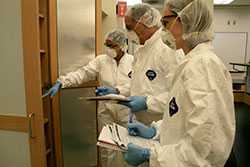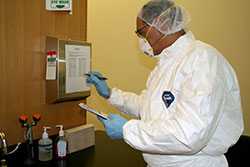Cross-Agency Collaboration Helps Keep the Country Safe from Bioterrorism

Possibility of Bioterrorism Resulted in Oversight of Disease-causing Select Agents. Federal agencies, private industry, academia, and state and local public health labs all handle disease-causing biological agents or toxins (i.e., select agents) for the purpose of improving public health, in areas such as vaccine development and patient care. Concerns about bioterrorism – the deliberate release of select agents such as anthrax and ricin, resulted in a series of laws being passed to establish and strengthen oversight of select agents. To execute these laws, multiple departments and agencies in the federal government have different authorities and expertise areas and must make sure that groups are handling select agents in a way that protects the safety of those working with the agents and the surrounding communities. Departments of Health and Human Services, Justice, Energy, Homeland Security, Defense, Veterans Affairs, and the Environmental Protection Agency all have a role to play in protecting the nation from, and responding to, a bioterrorism event.
Where Oversight Began. After a microbiologist was arrested for illegally obtaining the bacteria that causes plague, CDC’s Laboratory Registration and Select Agent Transfer (LRSAT) Program was established in 1996, providing the first registration and safety requirements for laboratories and individuals transferring select agents. The 2001 anthrax attacks heightened bioterrorism concerns, prompting Congress to pass legislation to strengthen oversight of select agents. As a result, CDC and USDA teamed up in 2002 to form the Federal Select Agent Program (FSAP) to ensure the safe and secure ownership, use, and transfer of select agents and toxins that pose a threat to animal, plant, and public health. CDC’s Division of Select Agents and Toxins and USDA’s Animal and Plant Health Inspection Service manage the FSAP, conducting entity inspections and providing guidance and support. Together, the FSAP oversees five types of entities that handle select agents – commercial, private, academic, federal government, and non-federal government. As of October 2013, 330 entities and over 10,000 individuals were registered with the FSAP.

Balancing the Need for Oversight with the Need to Get Legitimate Work with Select Agents Accomplished. There is no way around it – oversight (e.g., implementing increased safeguards and security measures, registering entities and individuals to handle select agents, and conducting inspections) takes time and resources for both the federal government and for those working with select agents. In addition to CDC and USDA, multiple federal departments and agencies have technical expertise and a role in safeguarding the country against bioterrorism. It is critical to find the best way to ensure safety and security without overburdening those legitimately handling select agents. The federal effort to provide oversight must be coordinated so that scientific work can move forward efficiently. To accomplish this, President Obama signed an Executive Order in 2010 requiring agencies to identify ways to consolidate activities.
Multiple Federal Departments and Agencies Coordinate Oversight Work and Enhance Efficiency for Those Handling Select Agents. After President Obama signed the executive order, CDC and USDA convened an interagency work group, with representatives from the Departments of Justice (DOJ), Energy (DOE), Homeland Security (DHS), Defense (DOD), Veterans Affairs (VA) and the Environmental Protection Agency (EPA). The workgroup has developed procedures and policies which are intended to make a tangible impact. Results of their collaboration include:
- Creation of a joint inspection program to increase efficiency and minimize duplication. A joint inspection program has been initiated among the Federal Select Agent Program and other federal agencies that fund or own entities where select agent work is conducted to minimize the number of select agent inspections that these entities undergo per year. Since the initiation of the joint inspection program, the Federal Select Agent Program has participated in 26 joint inspections.
- Improved information sharing. Memoranda of understanding have been signed between the Federal Select Agent Program and DHS, DOD, EPA, DOE, and the Veterans Health Administration to share information, including inspection data.
- Strengthened ability to conduct inspections through the inspector training program. The Federal Select Agent Program provides training for federal partners. The goal of the program is to provide the knowledge, skills, and experience to federal partners to enable them to conduct “internal” inspections of registered entities they own or fund, or to conduct joint inspections with the Federal Select Agent Program. On April 23-24, 2013, the Federal Select Agent Program conducted a joint Interagency Inspector Training Workshop in Riverdale, Maryland. Thirty-one inspectors from the Army Office of Inspector General, DHS, EPA, Army Material Command, Army Medical Command, Navy and Army International Affairs attended the training workshop.
The partnership between the different federal departments and agencies will continue, as they strive to keep the country safe from bioterrorism in the most efficient way possible.
- Page last reviewed: April 10, 2015
- Page last updated: April 10, 2015
- Content source:


 ShareCompartir
ShareCompartir